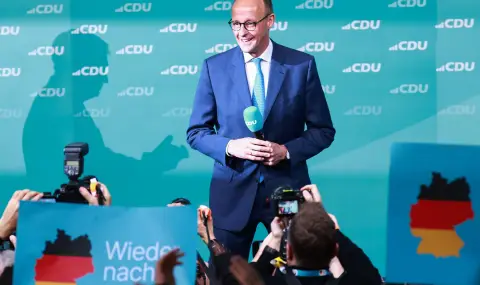According to preliminary results from the German elections, the conservative bloc of the Christian Democratic Union (CDU) and the Christian Social Union (CSU) is winning the most votes. Spiegel published the results of the votes counted at 5:10 a.m. local time.
The CDU, with its candidate for chancellor, Friedrich Merz, is emerging as the strongest party in the federal elections, but still failed to live up to expectations. According to preliminary results, the party received 28.5% of the vote, while the CDU was aiming for 30%.
The candidate of the CDU/CSU coalition for German chancellor, Friedrich Merz, declared victory in the general elections in Germany held on February 23. He stressed that this was a "historic election night" and that the coalition intends to complete the formation of the government by Easter at the latest.
The far-right Alternative for Germany party is the second-strongest party with 20.8%. This means that it has doubled its result compared to the last federal election. However, the party has no chance of coming to power, as Merz and other parties have said that they will not work with them.
The Social Democratic Party of the previous Chancellor, Olaf Scholz, suffered significant losses. At 16.4%, the Social Democrats reached a new historic low, and for the first time in their history they are ranked third in the federal election. Scholz said he would not participate in negotiations for a new government.
The “Greens“, who were also part of the "Traffic Light" coalition, lost only a small fraction of the vote compared to the SPD, receiving 11.61%. The Free Democratic Party failed to enter parliament, receiving 4.33%. The alliance of Sarah Wagenknecht, also called "Putin's friend" in Germany, also failed to enter parliament with 4.97%.
The situation with the Left is different: the party, which was written off even before the elections, made an impressive comeback and received 8.8%.
The outgoing government of Olaf Scholz will remain in power until the Bundestag elects a new chancellor.
The election campaign was marked by unprecedented interference from the United States, in particular by Vice President J.D. Vance and American billionaire Elon Musk. It also took place against the backdrop of numerous attacks on migrants and fierce debates about solving the problem of illegal migration.
